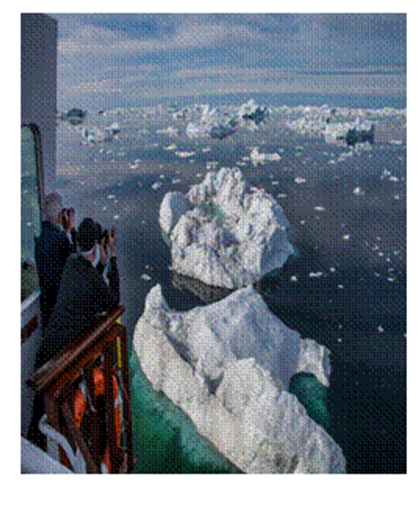Global Warming: Real and definitely alarming

Steve Haggerty/ Photography/Colorworld/TNS
Proof of melting icebergs in Greenland.
March 8, 2016
Weather talk anyone?
Although it’s a seemingly uninteresting topic, the winds of winter have warmed, and the effects of this are detrimental to both the future of humankind and Earth.
Many sighs of relief were expelled from the mouths of Clevelanders as the largest blizzard of the year narrowly missed Ohio. In fact, the warm weather of February broke records. The warmer fronts that have taken over the usual chilly weather are unfamiliar to the city and produced approval from residents who have yet to see a spring without snowy remains scattered everywhere.
However, these warmer fronts indicate more than a simple, snow-less spring. The high temperatures are a devil in disguise for those who recognize it for what it really is and have enough senses about them to bring up a long-ignored problem: Global Warming. Whether or not global warming is seen as a tree-hugger’s discussion, the Earth is warming at an alarming rate – that is undeniable.
An extreme amount of the population believes that global warming is still in an acceptance stage as a result of their exposure to denial from popular politicians. But the fact of the matter is global warming is “a phenomenon so thoroughly documented as to find agreement among virtually every leading body of American scientists…” said LiveScience.
LiveScience is a website that specializes in informing the general public of updates in scientific research of all sorts and they concur with the obvious signs of the natural catastrophe.
Here are the statistics from LiveScience: “Since the 1880s, average temperatures have risen 1.8 degrees Fahrenheit, on average and … today, we are unloading more than 30 gigatons of carbon dioxide into the atmosphere each year, according to the International Energy Agency. All that carbon pollution is cranking up the global thermostat to sweltering levels. Global warming is a term used to describe a gradual increase in … the Earth’s climate,” said LiveScience.
Notice the word “climate.”
Barbara Ancell, a science teacher who has done her research, drew the word to attention when she said, “Fluctuations in heat have been going on since the Earth started cooling, so you can’t just take this year’s weather to prove that the overall climate of the Earth is increasing. But I do think that there is an overwhelming amount of evidence to support the thesis of global warming’s existence.”
Similar to other well-established organizations addressing this issue, the National Resource Defense Counsel attributes global warming to the many greenhouse gases expelled by the inhabitants of Earth. Dan Lashof, writer for the organization’s articles, said, “In the United States, electric power plants emit about 2.2 billion tons of carbon dioxide (CO2) each year, or roughly 40 percent of the nation’s total emissions.”
Lashof is advocating for the Environmental Protection Agency (EPA) to pass a Clean Air Act to sharply reduce the pollution omitted from these power plants.
While much of the bad habits of Earth’s inhabitants involving pollution have started centuries ago, the very real effects of these habits are in the near future. In the article “Will Global Warming Heat Us Beyond Our Physical Limits”, from National Geographic, author Cheryl Katz said, “When the wet-bulb temperature [temperature that measures humidity] of the air exceeds that level [35° C], it becomes physically impossible for the body to … cool itself, especially by evaporating sweat. Even a fit individual would be expected to die from such heat within six hours.”
Additional to this up-and-coming effect, Ancell said, “I am worried for the immediate future generation of humans such as my nieces because, if current ice bergs melt and dilute the salt water that would affect the marine life that has adapted to the salty environment in addition to raising sea levels. This marine life would die off, affecting food availability for future generations drastically. That’s just one problem: There are so many others that will come.”
But even if the EPA passes this act, will the decrease in pollution be enough to halt the oncoming drastic climate changes that are to come? Ancell said, “The Earth is past its tipping point but we should still try and nurture our planet as best we can in order to make it better.”






















































